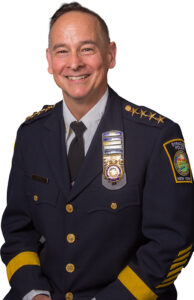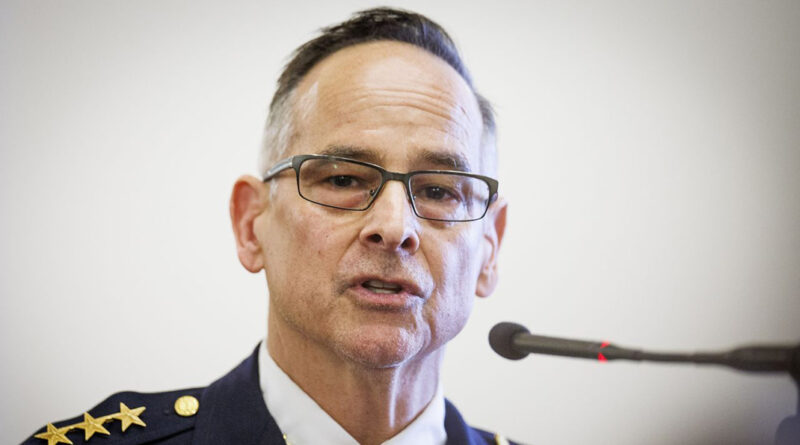What’s Next for Syracuse Police Chief Joe Cecile
After 40 years with the Syracuse Police Department, chief is about to retire: traveling, writing and hiking the Appalachian Trail are on his plans
By Mary Beth Roach
 Police Chief Joe Cecile, 64, will retire at the end of the year, having served on the police department for 40 years and as chief since April of 2022. He shares his thoughts on his career and the loss of Syracuse Police officer Michael Jensen and Onondaga Sheriff’s Deputy Lt. Michael Hoosock, who were tragically killed on duty in April of 2024.
Police Chief Joe Cecile, 64, will retire at the end of the year, having served on the police department for 40 years and as chief since April of 2022. He shares his thoughts on his career and the loss of Syracuse Police officer Michael Jensen and Onondaga Sheriff’s Deputy Lt. Michael Hoosock, who were tragically killed on duty in April of 2024.
Q: How many officers do you oversee?
A: About 50 less than I would like to oversee; 371 at this time, with more retirements coming.
Q: Do you have any specific retirement plans?
A: My wife, Cheri, and I plan to buy a large RV and travel around the country with our four English mastiffs. Also have a goal of section-hiking the Appalachian Trail. And, of course, continuing to write.
Q: You’re a writer? What do you write?
A: I write fiction, some short stories but mostly novel-length stories. Some of this writing involves police or crime-related themes, but some of it is simply characters faced with strange or unusual situations.
Q: Have you published anything?
A: Haven’t published anything yet. Actually, the first two novels I wrote were more therapeutic than anything else. Just had to get them out of my brain. But I get better every day and believe I will eventually publish if I keep at it.
Q: What do you see as your achievements as chief?
A: Few accomplishments occur in a vacuum. I’ve learned that the higher you ascend on the ladder of leadership, the more people you are indebted to. So as a team, I believe we have been able to bring officer morale up to a high level again. I also believe we have made great strides in the area of officer health and wellness, a topic I have always been keenly interested in.
Q: What have been some of the biggest challenges you’ve had as chief?
A: Clearly the biggest challenge of my career as chief of police was the challenge no chief of police hopes to ever face — the death of an officer. Officer Michael Jensen’s death hit us hard. Lt. Michael Hoosock’s too, of course. As the leader of the department, it hit me in a different way than probably anyone else. Even so, I knew this was not a time to think about myself, but a time to think about Michael’s family, to think about the department, to think of the young officers, some of whom had yet to even suffer the loss of a grandparent. We worked very hard to honor Officer Jensen and his family the way a fallen hero should be honored. But we also worked very hard to make sure this young department and its young officers had every available resource they needed to move on. And I believe we were successful. I know for myself, I will also feel a heavy burden and deep sadness when I think of April 14, 2024 or stand in front of the Police Memorial in Forman Park. But I will also feel pride at how this young department found a way to both remember Officer Jensen and honor him by returning to the uniform and the job he was so proud of.
Q: What are some of biggest changes you’ve seen within the department and the city as chief?
A: Technology is the winner here. When I started, we had portable radios the size of a large brick. In fact, it was referred to as “the brick.” We had no cell phones, no computers, no COPS cameras and certainly no body-worn cameras. When I started, we didn’t even have power windows in the cars. All this technology has enhanced the job of the individual police officer and the law enforcement field as a whole. Next up, drones, robot dogs, self-driving cars, who knows. One thing I do know is that technology will continue to alter the manner and tactics of police work, but it will never replace the police officer.
The second biggest change is in the quality of the officers. This is no shade on the old-school cops I came on the job with or the ones that preceded me, but speaking for myself, I could not do the job these young officers are doing today. I am continually amazed when I watch the BWC [body-worn camera] footage at the level of professionalism and efficiency these young officers show in the midst of even most traumatic and tragic events.
Q: Do you have any advice for your successor?
A: Never forget to focus more on the department, the officers and the community than you do yourself. Walk through the door every day asking yourself ‘How can I make this department better?’ and more importantly, ‘How can I improve the working environment of the officers, who have one of the most challenging jobs on the planet?’ Never miss an opportunity to stop and shake an officer’s hand when you see them in the hallway or on a call. Never miss an opportunity to ask them how things are going or compliment them about work or congratulate them on a major milestone. Never miss an opportunity to show them you care. Take care of the officers and they will take care of the community.

